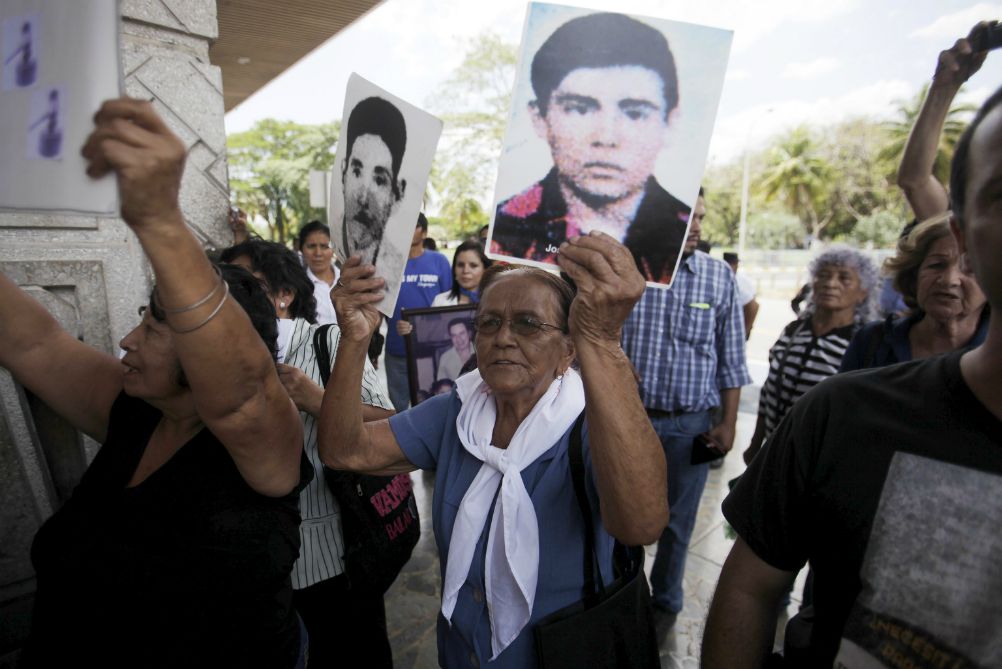
Relatives of war victims protest against retired Gen. Carlos Eugenio Vides Casanova, a former director of the Salvadoran national guard, upon his arrival at El Salvador International Airport April 8, 2015. Casanova was deported from the United States for his alleged involvement in torture and killings during the 1979 to 1992 civil war in El Salvador. (CNS /Reuters/Jose Cabezas)
Torture survivors seeking refuge in the United States shudder at reports of the killing of Saudi journalist Jamal Khashoggi.
"When they hear something like this, it brings them back to their torture chambers when they were being tortured, persecuted and humiliated," said Léonce Byimana, executive director of the Washington, D.C.-based Torture Abolition and Survivors Support Coalition (TASSC). The coalition is hosting a conference Nov. 2 on a global perspective on torture and the press at American University's Washington College of Law featuring journalists from Eritrea and Congo-Brazzaville who have survived grave human rights abuses.
"Most of our survivors have family members or friends who are doing journalism in different countries, and they can be tortured or killed at any time," he said. "The only hope for a torture survivor is for other people to denounce it and fight against it. When they see that torturers have the final say, there is no hope."
Abdinasir Kahim, a torture survivor from Somalia who received asylum in the United States, said news of Khashoggi is eroding his sense of trust.
"It brings back the nightmares," said Kahim, a 49-year-old taxi driver with three children who received treatment at Heartland Alliance's Marjorie Kovler Center for torture survivors in Chicago. "I cannot believe that people in authority, who are supposed to be protecting us, are using their power to torture and cut a body into pieces, and the president is actually defending the Saudi leadership.
"I owe my life to the compassion of the American people," he said. "The therapists at Kovler and others showed me human beings are good. Now my mistrust is coming back, and after all these years my trauma has been triggered."
Advertisement
Catholic activists have long spoken out on behalf of survivors, and many plan to go to the U.S.-Mexico border for an encuentro (gathering) Nov. 16 to 18 to support refugees and protest U.S. policy, an event organized by School of the Americas Watch, an advocacy organization founded by the former Maryknoll Fr. Roy Bourgeois to object to the training in torture techniques of mostly Latin American military officers by the United States Department of Defense. TASSC was started by Ursuline Sr. Dianna Ortiz, who survived torture in Guatemala.
Still, the thousands of survivors living in this country are rarely included in policy debates, although they are the most compelling advocates for the United States to end support of regimes that torture their citizens, punish perpetrators of violence at home, and provide a haven for survivors fleeing such threats as gang- and gender-based violence.
News of the travel ban on several Muslim countries, the proposed termination of legal status for about 300,000 Salvadorans, Hondurans, Nicaraguans and Haitians and the separation of parents and children at the border — an act of psychological torture — has triggered panic in refugees who fear losing their own sons and daughters and being deported to countries they once fled.
Even President Donald Trump's bashing of the press causes anxiety in survivors who saw restriction of press freedom in their own countries as the first sign of increasingly repressive regimes.
"No country can claim to be a democracy if it fails to protect the rights of the most vulnerable."
— Mario Gonzalez, Kovler Center director
Psychotherapist Mario Gonzalez, the Kovler Center's acting director, who fled Guatemala during the country's civil war, said that recent news has caused high levels of anxiety in clients who worry about losing the stability they worked so hard to achieve.
"They fear going back to the place they escaped from to face poverty, gangs and narco-trafficking," said Gonzalez, who spoke at Kovler's first day-long, sold-out, torture treatment symposium in October. "No country can claim to be a democracy if it fails to protect the rights of the most vulnerable," he added.

Journalists Memorial wall at the Newseum in Washington, D.C., displays the names of 2,323 people who have died while working as reporters and news photographers. Names are added annually. (Tracy Abeln)
Estimates of the number of torture survivors coming to the United States each year vary widely, from 10 to 30 percent of the refugee population. The National Consortium of Torture Treatment Programs, a group of 33 organizations in 18 states and the District of Columbia, says its centers have the capacity to treat 6,000 men, women and children who have survived deliberate infliction of severe physical or psychological pain carried out by a person in an official capacity — a fraction of those in need. Some centers have already closed due to lack of funding. Chicago's Touhy Health Center, which for four decades provided healthcare for refugees from 86 countries, is also shutting its doors at the end of the year.
Staff members and volunteers at treatment and advocacy programs testify in asylum cases and support survivors seeking legal redress. Salvadoran torture survivor Neris Gonzalez, a former catechist, spent a year working with her counselor at Kovler to prepare psychologically to challenge her country's two leading generals in the 1980s in a civil trial in Florida. In a historic verdict, the generals were found guilty of crimes against humanity.
More recently, the Chicago Torture Justice Center for survivors of police violence, formed in 2015 as a result of the Reparations Ordinance passed by the Chicago City Council, looked to Kovler for treatment guidance. Both groups witnessed similar repercussions in clients, including post-traumatic stress disorder resulting in lifelong vulnerability to anxiety, depression, flashbacks and intrusive memories.
Many survivors need ongoing psychological care to survive the frightening limbo of waiting to be granted asylum. They are never "cured," Gonzalez notes, but they can teach us about resiliency that allows people to find meaning in the most tragic circumstances. Still, even the strongest can crumble when a country puts their safety at risk.
[Human rights reporter Julia Lieblich, a scholar-in-residence at the Newberry Library, is co- author of Wounded I Am More Awake: Finding Meaning After Terror.]







